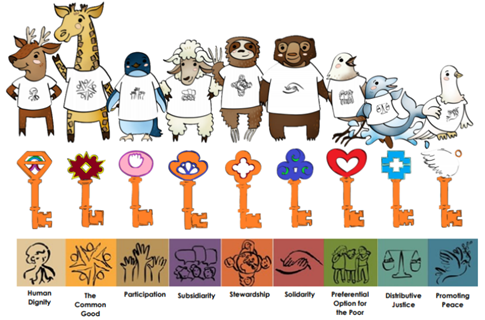Catholic Social Teaching (CST)

Catholic Social Teaching (CST) is rooted in Scripture, formed by the wisdom of church leaders, and influenced by grassroots movements. It is our moral compass, guiding us on how to live out our faith in the world.
Our faith calls us to love God and to love our neighbours in every situation, especially our sisters and brothers living in poverty. Following in the footsteps of Christ, we hope to make present in our unjust and broken world, the justice, love and peace of God.
By looking after others and the world around us, speaking out for justice and putting Catholic Social Teaching into action we are building a brighter world together.
At St Anthony's we are continually inspired by the teaching of Christ. We are guided by Pope Francis' 2015 encyclical Laudato Si' (praised be) on care for our common home and his 2020 encyclical Fratelli Tutti (all brothers and sisters) on fraternal love and social friendships. We use the CAFOD (Catholic Agency for Overseas Development) animal mascots, symbols and keys to teach and support the children's understanding of the core principles of Catholic Social Teaching.
Human Dignity - Everyone is special
St Paul tells us that each person is a work of art, created by God and chosen for a unique purpose. Ephesians 2:10
We recognise the human dignity of others by:
- being respectful
- treating people equally
- raising awareness of civil rights
- preferential option for the vulnerable
- by being aware of Protected Characteristics
- showing the virtues of love, charity and respect
The Common Good - Thinking of everyone
"You are not making a gift of your possessions to the poor person. You are handing over to them what is theirs." St Ambrose (340-397 AD)
We show we are part of a community by:
- working together
- working for the common good
- participating and engaging
- being active members of our community
Participation - Taking part
Do the hard work of getting along with each other, treating each other with dignity and honour. (James 3:17)
And he said to him, "You shall love the Lord your God with all your heart and with all your soul and with all your mind. This is the great and first commandment. And a second is like it: You shall love your neighbour as yourself. On these two commandments depend all the Law and the Prophets." Matthew 22:37-40
We recognise the dignity of work by:
- respecting all workers
- contributing to society
- making responsible economic choices
- supporting wellbeing and worker's rights
- sharing our talents with others
Subsidiarity - Everyone should have a say
Blessed are they who maintain justice, who constantly do what is right - Psalm 106:3.
Fear not for I am with you. I am your God. I will strengthen you. I will help you. I will uphold you with my righteous right hand. Isaiah 41:10
We acknowledge our rights and responsibilities by:
- recognising our duties as members of a community
- standing up for what is right
- following our school rules
- contributing to the life of the school through our various roles and responsibilities
Stewardship - Caring for God's gifts
The ecological crisis is also a summons to profound interior conversion...Living our vocation to be protectors of God's handiwork is essential to a life of virtue, it is not an optional or a secondary aspect of our Christian experience. Pope Francis - Laudato Si
We show we care for creation by:
- taking responsibility for our environment
- making environmentally responsible choices
- having awe and wonder for the natural world
- through the 'Live Simply' Award
Solidarity - Showing we care
Blessed Pope Paul VI taught that "If you want peace, work for justice." The Gospel calls us to be peacemakers.
We show solidarity by:
- raising awareness of social justice
- writing to our local leaders
- praying for others
- making connections
- making socially responsible choices
- inviting our local community to events
- visiting the local care homes
Preferential Option for the Poor - Putting people most in need first
'For I was hungry and you gave me something to eat, I was thirsty and you gave me something to drink, I was a stranger and you invited me in, I needed clothes and you clothed me, I was sick and you looked after me, I was in prison and you came to visit me.' Matthew 25:35-40
We show a preferential option for the poor and vulnerable by:
- fundraising for charitable causes
- raising awareness
- treating others with dignity and respect
- thinking of the needs of others
Distributive Justice - Sharing fairly
'...we are agreed today that the earth is essentially a shared inheritance, whose fruits are meant to benefit everyone.' Pope Francis, Laudato Si'
We recognise the need to share the worlds resources fairly by:
- celebrating Fair Trade Fortnight
- hosting book, clothes and uniform swaps
- by sharing our belongings
Promoting Peace - Being peacemakers
"Our common bonds- of humanity demand that we live in harmony and that we promote what is good for one another. These ethical implications are the reason why solidarity is a basic key to peace." St John Paul II
We show we are people of peace by:
- treating each other kindly
- turning away from conflict
- creating bonds between people
- loving others





